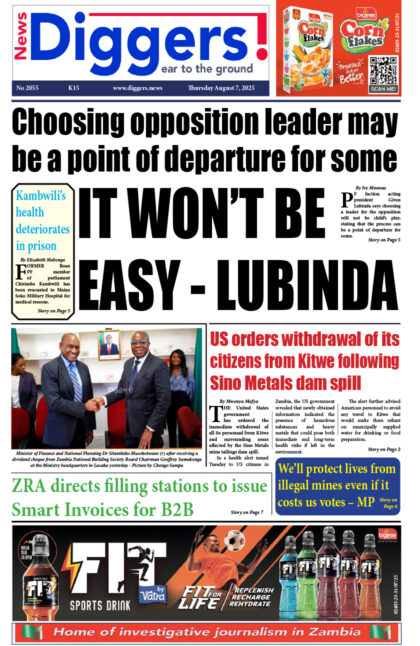Time, rather than death, is the best equaliser. In football, even a second from the final whistle can turn things around.
In death, we are all equal. However our style – rich or poor – we all are destined to the graveyard where we will decompose in like fashion.
No one has died. So make no mistake that we are wishing anyone dead. Neither are we being sadistic as to celebrate the downfall of another. Be it a loyal reader of our newspaper, a critic that helps us become better everyday, or a leader of any society; there misfortune is our misfortune and it affects us one way or another.
That’s why we draw the analogy of time and death to the news that flashed our screens last Friday when we learned one of Africa’s golden sons Kalusha Bwalya had met his waterloo.
It’s no longer news that FIFA has banned Mr. Kalusha Bwalya from all football activities for two years. There is also a fine of $100, 000 imposed. Really? We couldn’t believe the news. Yes, it may have been long overdue. But was it ever going to happen?
It came as a surprise to many. But to those well informed, it was a matter of time. Apart from being a soccer legend, Kalusha was once a golden boy in the corridors of football administration. He was virtually untouchable.
When journalists, ordinary Zambians and many football administrators raised the flag on accountability and transparency as he managed the game, they were dismissed as bitter elements, haters, jealousy, detractors or hired guns.
But today, our golden son is a statistic among the many that the new dawn in football has claimed. Kalusha joins a litany of football administrators that have literally fallen from grace.
He still has his name ranked among some of the greatest footballers in George Weah, Jay Jay Okocha, Nuwanko Kano, Finidi George, Abedi Pele and Roger Milla, among others, but the FIFA ban is a dent in his illustrious career.
He now goes down in the annals of football among the once powerful but the most criminal elements that swept through football top leadership. They include the godfather himself; Sepp Blatter, Jack Warner (former FIFA vice-president), Chuck Blazer (Ex-FIFA committee member), and Jerome Valcke (ex-secretary general of FIFA).
Following the statement by the FIFA ethics and adjudicatory committee, Kalusha responded saying he was not guilty. And in fact he is set to appeal the 2-year ban and $100, 000 fine.
Let’s face it, Kalusha dipped his fingers in a shady transaction. Not only did he dip, he admitted at the time that the $80, 000 he received from Qatari business magnet Mohamed Bin Hammam was a soft loan; in his words “yali ninkongole” secured on behalf of FAZ.
Whether that loan was remitted to FAZ or not having hit his personal account is a matter of common knowledge. And whether that soft loan was paid back is also an open secret.
For those whose memories may not be at their best, here is a snippet of what transpired. In 2009, Bin Hamman clandestinely launched his bid to unseat Blatter as FIFA president in an election that was to be held in 2011.
In doing so, Bin Hammam swung into campaign action and tapped into the African constituency as one of his block potential backer. CAF was willing to back Bin Hammam and most of its FA heads began to shift towards the Middle Eastern football superpower.
Kalusha was a beneficiary of Bin Hammam’s failed campaign and nine years later he is made to pay for things many advised him against.
When Blatter realised he was losing his grip on the African vote, he exposed Bin Hammam and subjected him to the ethics body which later banned the Qatari from all football activities putting an end to that 2011 bid.
And when it was time for Blatter’s fall, the investigation grew deep rooted. It went behind Qatar 2022 World Cup bid and Russia 2018. The Sunday Times of England delved into the dirty game and uncovered Kalusha’s transgressions, but he survived any formal punishment most likely because no one at FAZ raised the flag.
If we mean anything at all to Kalusha and those around him, our advice is that he stays clear of any appeal in this matter. In our view, an appeal has the potential to work against him. Granted, a $100, 000 fine is a real pain to fork out, but it could have been worse.
And the appeal comes with an additional $30, 000 fee which, if the matter was to go all the way to CAS may attract even extra fees. Is this the path Kalusha wants to take? The answer rests with him, but we are all well aware of what transpired – King Kalu pocketed an under the table envelope which is against the principles of good governance.
For those celebrating Kalusha’s setback but enjoying the kick backs at Football House, it’s time to learn something.
Make no mistake, receiving a bribe and abusing FIFA funds in the manner we have recently witnessed when FAZ president Andrew Kamanga and his team feasted on huge allowances is more or less the same infraction. The difference is that the two incidents are happening at different times. We can only hope Kamanga is learning from his predecessor and will do the right thing.
The bell that has tolled on Kalusha today will toll on anyone else including Kamanga, so be watchful.
























